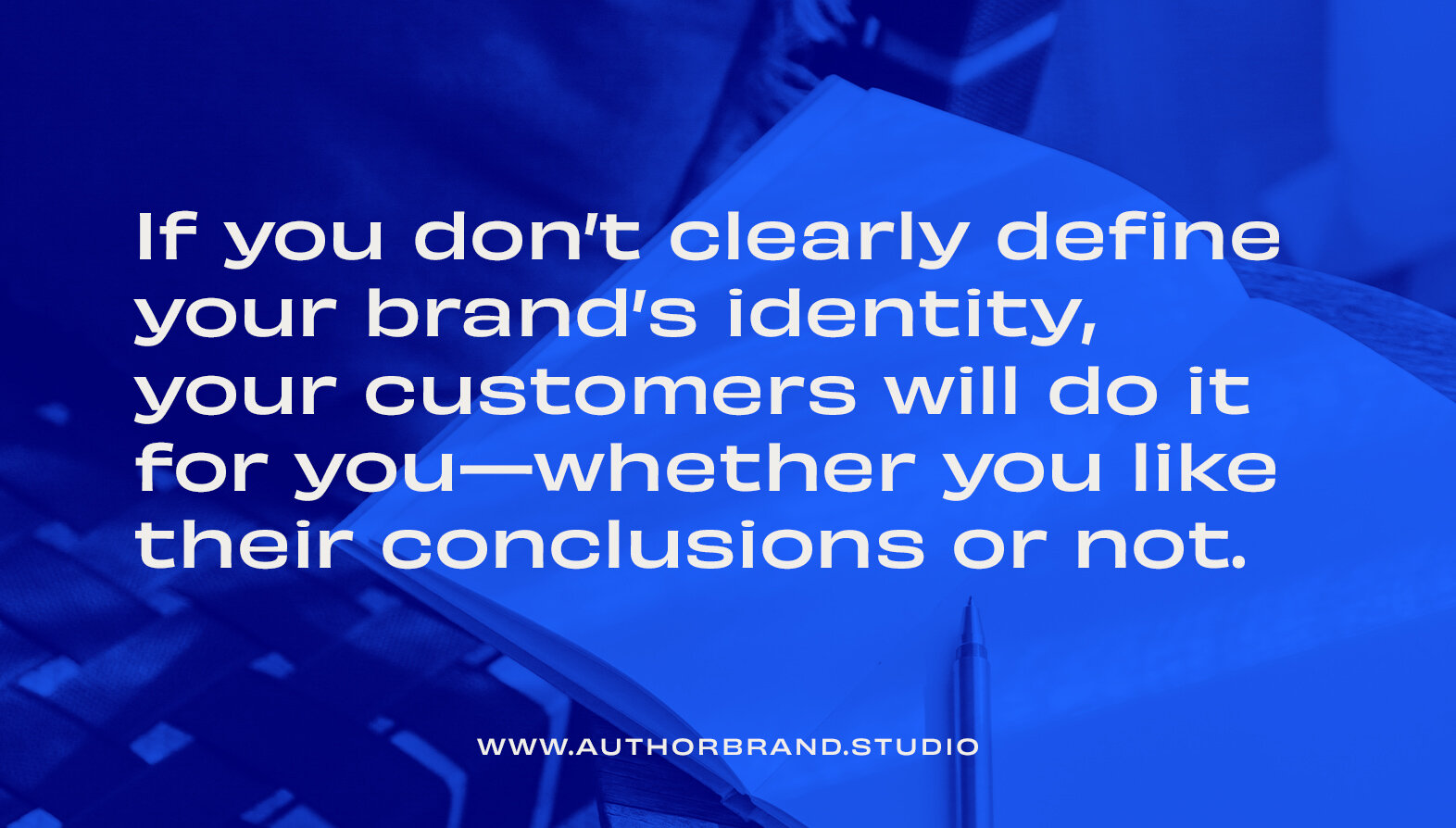5 critical reasons why your small business can't outgrow a poor brand strategy
Every small business has a brand strategy, whether you realize it or not.
From the moment your small business takes its first breath, as the entrepreneur in charge of this new endeavor, you’re setting the course your brand will take with every sale, interaction, and social media post.
Many startups think that brand strategy is just for “when we get bigger” or “when we hit 6 figures, then we’ll figure things out.” And that may be true to an extent, but:
Every business—small or large—is operating under a brand strategy, whether they know it or not.
Whether explicit or implicit, as the owner of your small business, you are driving your brand in a specific direction through your brand messaging, your brand identity, and your brand marketing.
So when your small business starts to become a mid-sized business, you’ll find your growth stunted if you don’t address the strategy that your brand is putting out to the world.
Let’s look at 5 critical reasons why your small business can’t outgrow a not-thought-out brand strategy:
Your business will grow aimlessly.
When it comes time to expand your offerings, such as adding on new products or services, if you don’t have a North Star to guide the direction your small business is growing in, you will easily get lost in the day-to-day grind of your business or in the whims of the moment.
Many entrepreneurs I talk to about their brand marketing say things like, “I started offering X but now I’m offering Y and I feel like my brand is really disorganized”; or, “I’m currently offering X but someday I’d like to offer Y but my business partner thinks I should offer Z.”
If you don’t have a clear, strategic foundation of what you do, who you do it for, and why it matters to them, you’ll wander aimlessly as your small business evolves, confusing both yourself and your customers in the process.
Trust me: I’ve been there, too. It’s easy when the going gets tough to think that pivoting your offerings or diversifying your services is the way to go, but your brand mission can get lost in the process, leaving your customers unclear about what you do and who you actually serve.
It’s not all doom and gloom, though! With a clear strategy for your brand, you can grow, diversity, and pivot without losing the core foundation you’ve built upon.
You can offer new products or services that still align with your core brand identity or find new ways to serve the same niche audience. The important thing is that you’re continuing to build upon the same foundation, your brand strategy.
Small businesses naturally evolve and grow over time, as the market desires shift, as world events demand pivots, as technology offers new opportunities and challenges. Staying flexible and adaptable is crucial to staying afloat.
In order to avoid brand confusion, a crucial element of consistent growth will be making sure that the twists and turns your small business may make over the years are all within the parameters of your previously-established brand strategy.
2. Your customers may define your brand identity improperly
This heading is a bit of a misleading statement, because the truth is your brand is who your customers say you are.
But you can define what you want your customers to say you are.
When you start out, personal connections, professional networks, social media, word of mouth is enough to spark your success; but as your small business grows outside of your immediate circles, there is more and more opportunity to be misunderstood or lost in the confusion.
Unless you tell your audience what you want them to think, say, and feel about your brand, they’ll draw their own conclusions based on the brand experience you’re giving them.
If your brand messaging on your website isn’t clearly defining what you do; if your Instagram posts aren’t speaking directly to your dream clients; if your visual identity of colors, fonts, and logos aren’t crafted to support your brand message—your customers will define a brand identity for you that may be quite different than what you wish it to be.
If you don’t clearly define your brand’s identity, your customers will do it for you—whether you like their conclusions or not.
By clearly defining your brand identity through your brand positioning, brand messaging, and more, you’ll make sure that the right people know you’re the right business for them.
3. You’ll waste money on your marketing efforts
Marketing is an excellent investment to make for your business, large or small, and the sooner the better.
Having partnered with and hired marketing agencies myself, I know that they are best equipped to do their job to the maximum potential when they have a clear brand strategy in hand.
When I can tell a marketing agency what my client’s brand positioning is; what makes them different from their competitors; who exactly they’re targeting; and provide them with the brand voice, taglines, and other brand story messages—they can make my client’s monetary investment go further with more impactful, targeted brand marketing.
Your dollars will pay off exponentially greater when they are spent on strategic—and not aimless—brand marketing.
Marketing is all about targeting the right people on the right platforms at the right time, but too many small businesses expend needless time, effort, and money trying to do all the things in order to reach all the people.
Worse, even if they outsource their brand marketing to an ill-equipped agency, their advertising campaigns, seasonal promotions, and evergreen marketing could be reactively strategic instead of proactively strategic.
Reactively strategic marketing means you are revising your marketing strategy based on trial-and-error or as a reaction to whatever is of the moment.
Proactively strategic marketing happens when you plan your brand marketing in advance, creating impactful promotions, campaigns, or evergreen content based around your core brand strategy, brand identity, brand values, and more.
As your small business turns into a medium-sized business into a large corporation, marketing will play an essential role in your brand’s growth: so make sure you are setting up your marketing agency for success and spending your marketing dollars wisely by having a clearly-defined brand strategy in place first.
4. You won’t be able to adequately train employees or create company culture
One of the critical components of a brand strategy are your brand values. These are the guiding principles that your brand operates under: what inspires you to do what you do.
These brand values are then shared with your employees in order for them to be instilled with the same brand values. After all, you want everyone on your team to be running in the same direction!
For example, if one of your key brand values is compassionate care, labeling this as a brand value and passing it along to your employees informs them that this value should drive their behavior with your customers.
You can also create scripts for team members answering the phone, write office policies, or even dictate company culture around those brand values in order to create a workplace that is unified around the same mission, values, and goals.
Your brand values, brand mission, and brand purpose inform and inspire your company culture, giving your employees a sense of unity and a shared common goal.
Without having these key internal brand values in place, you may find yourself managing a team that is here to do a job well and simply receive a paycheck at the end of it.
Having a sense of belonging is a critical component of 21st century workplaces, and your small business is no exception.
5. Your business will be less lucrative to investors or buyers
Not every entrepreneur dreams of selling their small business, but many who don’t still find themselves seeking financial investors or strategic partners.
Regardless of what the future holds for your business, it’s still important to note that having a strong brand is better long-term value.
Let’s test this theory by asking a question. If you were looking to invest in a 7- or 8-figure business, which would be more lucrative: one that simply offers a product or service, or one that does so with deeply-formed connections to its audience, intentionally-crafted brand messaging, and a purpose and mission its employees are all excited to work toward?
I’ve met entrepreneurs who tell me they want to pass their business on to their children someday; and I’ve met entrepreneurs who tell me they can’t wait to build a multi-million dollar business that they can sell off and earn themselves an early retirement on the beach.
Neither are bad paths, by the way.
But both paths will benefit from having a strategic foundation that’s stood the test of time and has guided the growth of the business into the value-laden brand it’s become.
The future of your brand depends on the foundation you build your small business upon today.
Make sure you’re building a foundation that is meant to last and grow beyond anything you can imagine.




